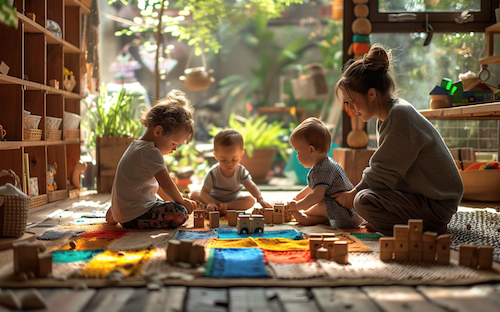How a Licensed Childcare Provider Supports Your Child’s Growth
The early years of your child’s life are a period of remarkable and rapid development, laying the foundational groundwork for all future learning, positive behavior, and health. While the home environment is the primary source of initial nurturing, enrolling your child in a licensed childcare facility offers a structured, enriching, and multi-faceted approach to growth that extends far beyond simple supervision. These professional settings are meticulously designed to support a child’s holistic development across cognitive, social, emotional, and physical domains, providing them with the tools and experiences necessary to thrive.
Read on to learn how a licensed childcare provider can support your child’s growth.

Cognitive and Language Development Through Intentional Curriculum
A licensed childcare provider implements a research-based curriculum and learning standards tailored to specific age groups, which is fundamental for stimulating cognitive growth and this is exactly the kind of foundation you can expect from a quality Moss Vale Childcare centre. Unlike informal care, these child care programs are designed by early childhood educators to challenge and expand a young mind’s capabilities. Enjoyable activities are also purposeful. For instance, story time can enhance vocabulary and listening comprehension, block play can introduce basic principles of physics and engineering, and sorting games can develop critical math skills, such as categorisation and pattern recognition.
Additionally, the language-rich environment of a quality centre has a particularly significant impact. Children are consistently exposed to a flood of language through conversations with trained educators, group discussions, songs, and many books. This constant immersion can significantly accelerate vocabulary acquisition and language fluency. Educators are skilled in using “scaffolding” techniques, where they build upon your child’s existing knowledge to introduce new concepts and more complex sentence structures, thereby propelling linguistic and intellectual development forward in a structured manner.
Lastly, if you’re seeking a comprehensive approach to early education that focuses on cognitive and language development, you can typically find that established centres like Warooga Child Care exemplify this integrated philosophy. Such providers understand that growth is a tapestry woven from diverse experiences and guided play-based interactions.
Fostering Social Skills and Emotional Intelligence
The group setting of a licensed facility with accommodating child care staff is a unique social laboratory where your child learns the complex rules of interaction. This is where they first practice essential life skills and communication skills such as sharing, taking turns, negotiating, and cooperating to achieve a common goal. Under the guidance of attentive educators, your child can learn to navigate conflicts, express their needs appropriately, and develop empathy by recognising and responding to the feelings of their peers.
Additionally, emotional regulation is a critical skill honed in this environment. Your child can experience a range of emotions throughout the day, from frustration over a toy to joy in a new friendship. Educators can provide the support and strategies needed to help individuals identify, understand, and healthily manage their feelings. This process of learning to wait, cope with minor disappointments, and celebrate others’ successes can help build a strong foundation for emotional resilience and self-confidence, which is crucial for future school and life success.
Promoting Physical Health and Motor Skills
Your child’s physical development is actively supported through both structured and unstructured activities. Licensed and qualified providers can ensure that your child has ample opportunities for gross motor play, which is vital for building strong muscles, improving coordination, and expending energy. Playing outdoors on safe, well-equipped playgrounds allows for activities such as running, jumping, climbing, and balancing, all of which contribute to overall physical health and spatial awareness.
Simultaneously, fine motor skills are meticulously developed through activities within the classroom. Tasks such as drawing, painting, using safety scissors, manipulating playdough, and assembling small building blocks can strengthen the small muscles in the hands and fingers. This aspect of child development is directly linked to academic readiness, as strong fine motor control is a prerequisite for the precise hand movements required for writing.
Cultivating Independence and School Readiness

One of the most significant benefits of a licensed childcare setting is its role in fostering independence and preparing your child for the formal structure of kindergarten as part of their early intervention programs. Your child is encouraged to take on small, age-appropriate responsibilities, such as putting away their belongings, serving themselves snacks, and cleaning up after activities. These tasks can build a sense of capability, self-reliance, and personal responsibility.
Furthermore, the daily routine of a centre with a child care license, with its predictable schedule of group activities, mealtimes, rest periods, and free play, mirrors the structure your child will encounter in school. This familiarises them with following instructions, transitioning between activities, and functioning as part of a larger group. By the time they enter kindergarten, children from a quality childcare environment may often be more adept at interacting with a learning specialist and engaging in a classroom setting, giving them a significant head start in their educational journey.
Key Takeaway
A licensed childcare provider serves as an indispensable ally in your child’s early development and personalized care. By keeping the information mentioned above in mind, you can work with a licensed childcare provider who supports growth in every critical domain. From cognitive and linguistic advancement to social, emotional, and physical mastery with orientation sessions, the experiences gained in a quality childcare setting can provide the essential building blocks for a lifetime of learning and well-being.